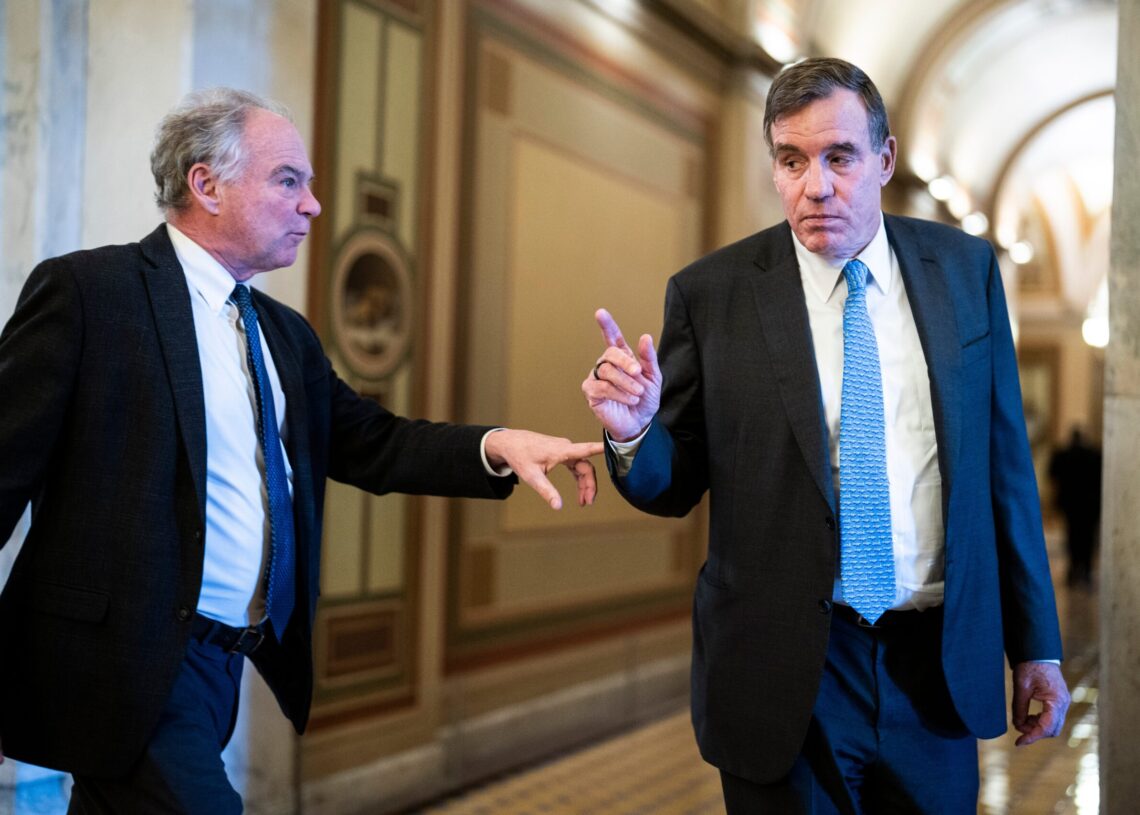For more than two decades, Sens. Tim Kaine and Mark R. Warner seemingly found little to disagree about during their parallel rise through the ranks of Virginia politics.
The two Democrats, who served as back-to-back governors in Richmond during the 2000s and then came to Capitol Hill a few years later, often speak in a unified voice on both regional and national matters. They have taken united stances on such matters as the Trump administration’s tariffs and federal worker job cuts.
For more than two decades, Sens. Tim Kaine and Mark R. Warner seemingly found little to disagree about during their parallel rise through the ranks of Virginia politics.
The two Democrats, who served as back-to-back governors in Richmond during the 2000s and then came to Capitol Hill a few years later, often speak in a unified voice on both regional and national matters. They have taken united stances on such matters as the Trump administration’s tariffs and federal worker job cuts.
But this week, the allies split on a major tactical decision: whether to work with Republicans to end the longest federal government shutdown in U.S. history.
In a development that surprised and angered some liberal voters, it was Kaine — often seen as the further left of the two lawmakers — who struck a deal with the GOP to reopen the government, along with seven other members of the Senate Democratic caucus.
Warner, meanwhile, was one of 40 senators who stuck to the Democratic Party line and refused to approve a spending plan without extended health care subsidies for millions of Americans.
That split highlights how the changing politics of both Virginia and the Democratic Party have scrambled conventional wisdom in ways that surprised even the most attentive of observers.
“If you told me there’s a progressive and a moderate [representing the commonwealth] who voted in different ways, I’d come up with the exact opposite of what happened,” said Mark Rozell, dean of the Schar School of Policy and Government at George Mason University.
He suspected that election timing — Warner is up for reelection next year, while Kaine is not on the ballot until 2030 — might help explain their divergent choices.
But with some other Virginia Democrats — including Gov.-elect Abigail Spanberger — signaling their support for Kaine’s move, Rozell said the divide between the two is emblematic of intraparty tensions over the shutdown that could carry into next year.
“There’s going to be a good deal of infighting within the party over this action,” he said, “which distracts somewhat from focusing on the [GOP] and the Trump administration.”
Democrats presented a united front earlier this year when they refused to approve a federal budget that would not extend pandemic-era tax credits that lower the cost of health insurance for millions of Americans. Any spending plan requires 60 votes to pass in the upper chamber, where the GOP holds a 53-47 majority over Democrats and the two independents who caucus with the party.
The stalemate led to a shutdown that has dragged on since Oct. 1, one that eventually began to imperil food assistance benefits, delay thousands of flights and leave federal employees without pay. Virginia has more than 850,000 residents in the Supplemental Nutrition Assistance Program, known as SNAP or food stamps, and one of the country’s largest concentrations of federal workers and contractors.
Kaine, six other Democrats and one independent who caucuses with the party bartered a deal with GOP leaders over the weekend, agreeing to approve the budget as long as the deal reversed layoffs the Trump administration attempted to implement during the shutdown and prevented additional layoffs through Jan. 30. Kaine, who called it a “moratorium on mischief,” was one of the last to sign on.
Speaking to reporters in a Zoom call on Monday, he also cast the deal as a way to pay federal workers while at least securing a vote on the health care subsidies — a matter that could prove politically volatile for Republicans in next year’s congressional midterm elections.
There’s no guarantee of extending those Affordable Care Act tax credits, Kaine said, “but we have a guarantee of a very high-stakes debate and vote on the Senate floor in the full view of the American public, without the background noise of shutdown consequences drowning out the critical nature of the health care debate.”
Warner said in a statement explaining his stance that he appreciated protections from future layoffs, echoing some of Kaine’s logic. But he nonetheless stuck to the message pushed by top Democratic leaders.
“I cannot support a deal that still leaves millions of Americans wondering how they are going to pay for their health care or whether they will be able to afford to get sick,” Warner said in a statement.
Kaine and Warner appeared on the same ballot just once in 2002, when Warner — a onetime party chairman who had quietly been building up an electoral base in Southwest Virginia — was elected governor and Kaine, then the mayor of Richmond, became lieutenant governor.
As they gained broader recognition and then began serving in the Senate together, it would have been hard to guess that they would end up on opposite sides of such a crucial and closely-watched agreement.
Stephen Farnsworth, a political science professor at the University of Mary Washington, pointed out that the other seven senators who signed on to the deal with the GOP have either announced they won’t be seeking reelection or, like Kaine, will not face voters in next year’s elections.
“Elected officials who are further from their next election are less concerned by political considerations and more focused on what they see as the best policies,” Farnsworth said.
The opposite is true, he said, for Warner. A business-friendly Democrat in line with Virginia’s traditionally moderate leanings, he came within less than one percentage point of losing his seat in 2014 — a nearly career-ending outcome that some attributed to Obamacare’s sagging popularity, while others said it was a result of Warner’s failure to rally the base.
Warner was one of the moderate senators who took part in the “talking stick gang” that helped quickly end a 2018 shutdown. But he is up for election again next year in a much bluer Virginia, so giving the party’s left flank reason to oppose him would be an easy way to hurt his chances, Farnsworth said.
Stewing frustration with the Democratic establishment has yielded some aggressive Senate primary battles in states such as Maine and Michigan between centrist party stalwarts and liberals looking to shake up the system, in some cases from outside the ranks of elected office.
“I doubt that this vote will be a major concern for anybody running for office five years from now, but it could certainly impact candidates who are facing a primary in eight months,” Farnsworth said.
That reality is in and of itself another reflection of how Virginia has changed since both Kaine and Warner entered office, political observers said.
While most of the others who joined Kaine represent perennial battleground states such as Nevada and New Hampshire, Virginia is no longer on that list. The commonwealth has not voted to put a Republican in the White House since 2004.
Two Republicans, including state Sen. Bryce E. Reeves (Orange), are seeking the nomination to challenge Warner in the general election, but the real electoral test will instead come in a potential primary.
Still, that didn’t stop the two Senate allies — who said they spoke extensively about their decisions on the deal before Sunday — from saying they respected teach other’s logic.
Kaine, who has noted that “reasonable people could disagree,” told reporters during the Zoom call: “You know, the issue for all the Democrats was, ‘Was this enough?’ Some of us concluded it was, and some of us concluded that it wasn’t.”
The post Why Virginia senators Kaine and Warner were split on vote to end shutdown
appeared first on Washington Post.




